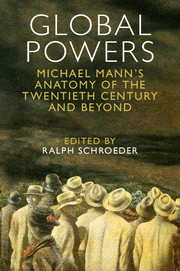Book contents
- Frontmatter
- Contents
- List of contributors
- 1 Introduction
- Part I Theory and history
- Part II Political, economic, military and ideological questions
- Part III American exceptionalism
- Part IV Empire
- 12 Mann and the problem of empire
- 13 Hegemonic power during the Cold War and beyond
- 14 The last empire? American power, liberalism, and world order
- Part V Response
- Index
- References
12 - Mann and the problem of empire
from Part IV - Empire
Published online by Cambridge University Press: 05 April 2016
- Frontmatter
- Contents
- List of contributors
- 1 Introduction
- Part I Theory and history
- Part II Political, economic, military and ideological questions
- Part III American exceptionalism
- Part IV Empire
- 12 Mann and the problem of empire
- 13 Hegemonic power during the Cold War and beyond
- 14 The last empire? American power, liberalism, and world order
- Part V Response
- Index
- References
Summary
The resurgence of interest in ‘empire’ and empires has been one of the more striking academic developments of recent years. Inevitably, it has been driven in part by polemic and political debate. But something more interesting has also been happening. Not long ago it was usual to assume that empires – certainly modern empires – represented a great aberration from the High Road of history on which all the sign posts clearly pointed ‘This Way to the Nation State’. Empires delayed, distorted and even destroyed the (supposedly) universal impulse towards the formation of national communities. They were also invariably predatory, despotic, militaristic and, since they often seemed under the sway of a powerful individual – the ‘emperor’ – they could also be seen in varying degrees as psychopathic phenomena in their drive for what Schumpeter called ‘objectless expansion’ (Schumpeter, 1951). Except to their benighted champions, they were obviously a ‘bad thing’. Indeed some historians felt obliged to assert their hatred for empire in case writing about them was mistaken for admiration. That empires possessed all these defects, and worse still were bound to fail, was amply proved to most commentators’ satisfaction by their post-1945 collapse. Alas, we are no longer so sure.
If contemplating the contemporary scene has discouraged the belief that empires belong to the irrelevant past, another powerful influence has been the revival of longue durée global history. To an extent that would have struck many observers in the 1970s and 1980s as remarkable (and shocking) it is now almost a commonplace to say that empires have been the default form of political organisation above the pettiest scale for most of the world and most of world history. Two implications might follow, one perhaps easier to swallow than the other. (1) It becomes more difficult to treat empires as a metahistorical blockage to human progress. That is not to say that they become a ‘good thing’. But they become an object of study without overriding moral preconceptions, even if we might conclude that some were better than others by certain criteria of human happiness.
- Type
- Chapter
- Information
- Global PowersMichael Mann's Anatomy of the Twentieth Century and Beyond, pp. 229 - 245Publisher: Cambridge University PressPrint publication year: 2016
References
- 1
- Cited by



